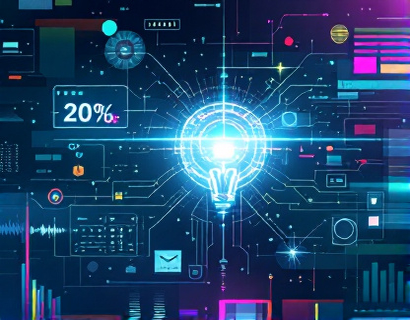Unleashing the Future of Digital Transformation: The Synergy of Crypto and AI
The intersection of cryptocurrency and artificial intelligence (AI) is giving birth to a new era of digital transformation, one that promises to revolutionize how we interact with technology and conduct business. For tech pioneers and early adopters, understanding the convergence of these two powerful forces is crucial for staying ahead in an increasingly competitive landscape. This article delves into the transformative impact of merging cryptocurrency and AI, exploring the innovations that are reshaping the digital world and providing valuable insights for those at the forefront of technological advancement.
The Emergence of Crypto and AI
Cryptocurrency, since its inception with Bitcoin in 2009, has evolved from a niche digital currency to a catalyst for broader technological change. The underlying blockchain technology has proven to be more than just a means for decentralized transactions; it has become a foundation for building secure, transparent, and efficient systems across various industries. Meanwhile, AI has rapidly advanced, driven by exponential growth in data, computational power, and algorithmic sophistication. The combination of these two technologies is unlocking new possibilities that were once the realm of science fiction.
Enhanced Security through AI-Driven Crypto Solutions
One of the most significant benefits of merging crypto and AI is the enhancement of security measures. Traditional cryptographic methods are being augmented with machine learning algorithms to detect and prevent fraud more effectively. AI can analyze vast amounts of data in real-time, identifying patterns and anomalies that indicate potential security threats. Smart contracts, which are self-executing contracts with the terms directly written into code, can be fortified with AI to ensure compliance and reduce the risk of manipulation. This synergy not only protects users but also builds trust in blockchain-based systems.
Optimized Network Performance with AI
The performance of blockchain networks is a critical factor in their adoption. AI can optimize network operations by predicting and managing congestion, adjusting consensus mechanisms dynamically, and improving transaction processing speeds. Machine learning models can analyze network traffic and user behavior to optimize resource allocation, ensuring that the network remains efficient and scalable. This is particularly important for cryptocurrencies that aim to support high-volume transactions, such as those in the finance and e-commerce sectors.
Decentralized Finance (DeFi) and AI
Decentralized Finance (DeFi) is a prime example of how crypto and AI are transforming the financial landscape. DeFi platforms leverage blockchain to provide traditional financial services without intermediaries, offering greater transparency and accessibility. AI plays a pivotal role in enhancing these platforms by providing sophisticated risk management tools, automated trading algorithms, and personalized financial advice. AI-driven analytics can help users make informed decisions, optimize portfolios, and mitigate risks, making DeFi more accessible and appealing to a broader audience.
Supply Chain Transparency and Efficiency
Supply chain management is another area where the combination of crypto and AI is making a significant impact. By integrating blockchain with AI, companies can achieve unprecedented levels of transparency and efficiency. AI can track and analyze data from various points in the supply chain, ensuring that products are authentic and ethically sourced. Smart contracts can automate payments and verify compliance with contractual terms, reducing delays and disputes. This not only streamlines operations but also enhances consumer trust and brand reputation.
Identity Verification and Privacy
Privacy and identity verification are critical concerns in the digital age. The fusion of crypto and AI offers robust solutions to these challenges. Self-sovereign identity (SSI) systems, powered by blockchain, allow individuals to control their personal data and authenticate themselves without relying on centralized authorities. AI enhances this process by providing advanced biometric verification and behavioral analysis, ensuring that only authorized users access sensitive information. This approach not only protects user privacy but also complies with stringent data protection regulations.
Innovative Business Models
The convergence of crypto and AI is giving rise to innovative business models that disrupt traditional industries. For instance, tokenized economies within gaming and virtual worlds enable creators to monetize their content directly, without intermediaries. AI-driven marketplaces can match supply and demand more efficiently, while decentralized autonomous organizations (DAOs) leverage AI to make collective decisions and manage resources autonomously. These models not only create new revenue streams but also empower users and creators alike.
Challenges and Considerations
While the potential of combining crypto and AI is immense, there are challenges that must be addressed. Regulatory uncertainty remains a significant hurdle, as governments worldwide grapple with how to govern these emerging technologies. Ensuring compliance and navigating the legal landscape is crucial for businesses and developers. Additionally, the environmental impact of blockchain, particularly proof-of-work (PoW) systems, is a concern that needs to be mitigated through more sustainable consensus mechanisms. Ethical considerations, such as data privacy and the potential for AI bias, must also be carefully managed to build a trustworthy and inclusive ecosystem.
Future Prospects
Looking ahead, the integration of crypto and AI is poised to drive further innovation and transformation. As technology continues to evolve, we can expect to see more sophisticated applications in areas such as healthcare, education, and smart cities. The development of interoperable blockchain networks and the standardization of AI protocols will facilitate seamless integration and collaboration across different platforms. The potential for AI to enhance the functionality and utility of cryptocurrencies will continue to grow, opening up new frontiers in digital finance and beyond.
Conclusion
The synergy between cryptocurrency and AI represents a powerful force for digital transformation, offering unprecedented opportunities for tech pioneers and early adopters. By embracing these technologies, individuals and organizations can stay at the forefront of innovation, driving meaningful change and creating value in a rapidly evolving digital world. As the landscape continues to unfold, staying informed and adaptable will be key to harnessing the full potential of this transformative combination.










































